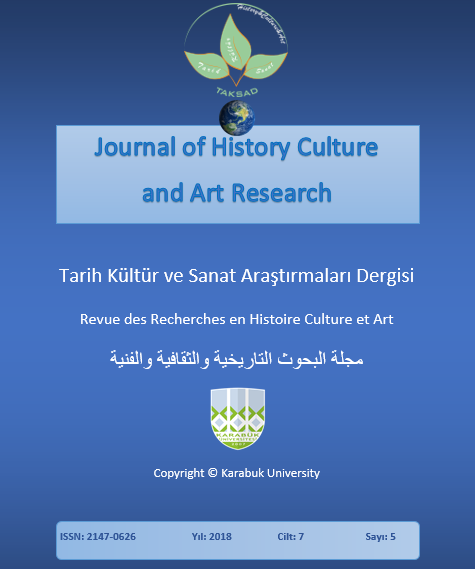Decomposition of Educational Objectives in the Context of Hermeneutic Experience of Future Music Teachers
DOI:
https://doi.org/10.7596/taksad.v7i5.1917Keywords:
Higher arts education, Decomposition, Educational objectives, Hermeneutic experience, Hermeneutic approach, Future music teacher.Abstract
The modern stage of education and science development witnesses a need in competent teachers capable of showing high adaptability, who are ready to address new pedagogical tasks and embrace active innovations, as well as shift away from stereotypes and conventionality of the educational process. The educational process as such has hermeneutic sense, because in this very process the change of major forms of a subject’s cognitive activity occurs, as we are referring to the formation of a subject who not only understands but also is also capable of interpreting their experience. The phenomenon of hermeneutic experience integrates the world of notions, images, spiritual experiences through which the subjects of the pedagogical process make transformations necessary for the comprehension of the Truth, as it helps to discover the integrity and the moral in the context of understanding the texts of culture. Hermeneutic experience is one of the significant aspects of professional training of future music teachers. That is why decomposition of educational objectives becomes topical, as it can refocus the aim of the educational process from forming knowledge, abilities and skills to forming hermeneutic experience of future music teachers.
References
Gadamer, H. G. (1988). Istina i metod. Osnovy filosofskoy germenevtiki [Truth and method. The fundamentals of philosophical hermeneutics]. Moscow: Progress.
Gadamer, H. G. (1991). Aktualnist prekrasnoho [The relevance of the beautiful]. Moscow: Iskusstvo.
Gadamer, H. G. (n.d.). Tekst i interpretatsiya [Text and interpretation]. URL: http://anthropology.ru/ru/texts/gadamer/txtint_1.html.
Klarin, M. V. (2017). Instrument innovatsionnogo obrazovaniya: transformiruyushchee obuchenie [Means of innovative education: transforming education]. Pedagogika [Pedagogics], 3, 19-27.
Klarin, М. V. (2000). Interaktivnoe obuchenie – іnstrument osvoeniya novogo opyta [Interactive learning – a tools for mastering new experience]. Pedagogika [Pedagogics], 7
Kolb, D. (1984). Experiential Learning. Englewood Cliffs (NJ): Prentice Hall.
Lisun, D. V. (2011). Formuvannia profesiinykh hermenevtychnykh umin maibutnoho muzykanta-vykonavtsia u fakhovii pidhotovtsi [Formation of professional hermeneutic skills of a future musician-performer in the course of professional training]. Extended abstract of candidate’s thesis: major 13.00.04 «Theory and methodology of professional education». Kyiv.
Motroshilova, N. V. (2007). Poniatie i kontceptciya zhiznennogo mira v pozdnei filosofii Edmunda Gusserlia [Notion and concept of the lifeworld in late philosophy of Edmund Husserl]. Voprosy filosofii [Issues of philosophy], 7.
Oleksiuk, О. M.; Tkach, М. М. & Lisun, D. V. (2013). Hermenevtychnyi pidkhid u vyshchii mystetskii osviti [Hermeneutic approach in higher artistic education]: collective monograph. Kyiv. Borys Grinchenko Kyiv University
Oleksiuk, О. М.; Tkach, М. М. & Bondarenko, L. А. (2015). Dukhovno-smyslova intuitsiia u formuvanni hermenevtychnoho dosvidu maibutnoho vchytelia muzychnoho mystetstva [Spiritual and meaningful intuition in the formation of hermeneutic experience of a future music teacher]. In Ohneviuk, V.O., Khoruzha, L.L., Sysoieva, S.O., Chernukha, N.M., & Terentieva, N.O. (eds.), Kompetentnisno zoriientovana osvita: yakisni vymiry [Competence-oriented education: quality values]: [monograph], (pp. 292-309). Kyiv: Borys Grinchenko Kyiv University.
Senko, Yu. V. & Shkunov, V. G. (2012). Germenevtika pedagogicheskogo opyta [Hermeneutics of pedagogical experience]. Pedagogika [Pedagogics], 2, 21-29.
Downloads
Published
How to Cite
Issue
Section
License
All papers licensed under Creative Commons 4.0 CC-BY.- Share — copy and redistribute the material in any medium or format
- Adapt — remix, transform, and build upon the material for any purpose, even commercially.
Under the following terms:
Attribution — You must give appropriate credit, provide a link to the license, and indicate if changes were made. You may do so in any reasonable manner, but not in any way that suggests the licensor endorses you or your use.
- No additional restrictions — You may not apply legal terms or technological measures that legally restrict others from doing anything the license permits.







